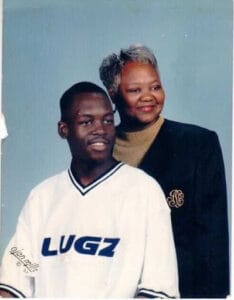Convicted by Accountability and Felony Murder
Christopher Carter

In 2006, Christopher Carter received a 100-year sentence for his involvement in a crime that occurred when he was just 20 years old. Illinois law and that sentence mean Chris will die in prison, with no opportunity for a second chance, unless he receives some kind of clemency.
Cook County prosecutors charged Christopher through Illinois’ “Law of Accountability.” The state’s accountability law allows someone to be held responsible for a crime committed by another person. Someone could be charged through accountability if prosecutors say they failed to report the crime, acted as a lookout, or had other direct or indirect involvement. This law fails to account for whether an individual planned, agreed to, or intended to participate in the crime. In this case, the primary defendant took a plea deal and is actually serving a shorter sentence than Christopher.
The youngest of those charged in the case, Chris said he had prior no criminal record and was deemed the least culpable. “If sentences between (someone) convicted by accountability and (someone considered the principal) reflect the different degrees of participation in the crime, how is it that one can be given the same, if not more, time than the principal?” he questioned.
Illinois abolished parole in 1978 so no one sentenced after that year is eligible for parole review. In addition, in 1998, Illinois established “truth-in-sentencing,” meaning people convicted of certain offenses cannot receive any time off their sentences for good behavior or program participation. In other words, there are few real pathways for Chris to come home sooner.
Chris feels great remorse for the crime that occurred. He hopes his story will reach others at risk of being involved in a similar situation. Chris acts as a mentor for a university student. “My favorite part of being a mentor is being able to put myself, and all of the things that are going on in my life, to the side and being that someone that others can count on in their time of need,” he explained.
In prison, despite having no real pathway to come home, Chris has utilized his passion for woodworking and craftsmanship and continues trying to improve his skills. He remembers watching home remodeling and woodworking shows as a child in his parents’ bed on Sunday mornings. So, while incarcerated, he found a program to hone these interests into a real craft.
Chris hopes for a second chance so he can someday put the skills he has learned to use in order to benefit others. “All in all, just being able to give back is all the motivation,” he says.
Chris often speaks on the phone with his mom and he wishes he could better support her. “Chris is my baby. He is a good son, and I just want him to come home so he can take care of me,” his mom said.

